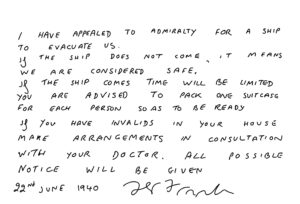This poem talks about the impact that the evacuation had on the Alderney islanders- all of whom were evacuated, arriving in the UK on 23rd June at Weymouth before going by train mainly to the north of England where they spent 5 years. Although the Channel Islands were liberated in May 1945, the Island of Alderney was not habitable until the December of that year. Islanders arrived back with with very little and had to be given utility furniture for their empty houses. Islanders not only lost loved ones, but also their whole way of life had changed, their language, their culture.
Their lives were turned upside down.
(Information from the Alderney Museum)

This note was written by Judge French and pinned to the courthouse door on 22 June 1940. By this time most of the islanders on Guernsey who were going to evacuate had left, and the Alderney people were left wondering if anyone was going to come for them.
When the boats came, we had two hours to pack our life.
My ancestors had farmed this strip since medieval times.
We took the dog to the butcher and his body was added to the bloody pile
but we didn’t tell the children.
One suitcase each and we didn’t lock the door.
My invalid mother was carried down the hill but the children thought it was an adventure and they laughed as their childhood was captured in one last photograph.
The chatter didn’t drown the distance guns;
they were close.
The island disappearing into the gloom was imprinted on my mind, “à bétao” I whispered to myself.
The crossing was rough and we were squashed in more than the boat was meant for; we were scared.
When we arrived at the port the local people were kind; they gave us food and blankets and we rested.
We finally made it to our new home; they had got a translator but we talked their language and the unaccompanied children lined up to be chosen.
Five long years we stayed.
Our children grew up forgetting their language, their heritage; they became locals.
They cried when it was time to go back to a distant memory of a forgotten childhood.
Our house was a shell; to keep warm they had burnt our furniture and wooden door frames.
Only walls stood.
We had nothing.
They had kept the best furniture so it was brought out into a field and we fought off our friends to take what wasn’t ours.
Embarrassed -we closed our doors to the neighbours that day
Everything that defined us was gone.
Forgiveness did not come easily.
Lest we forget


